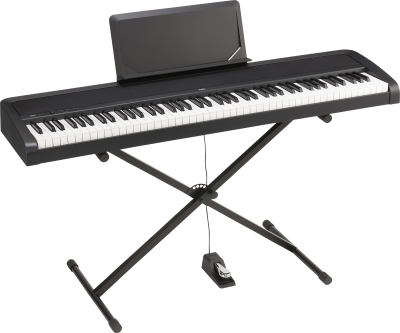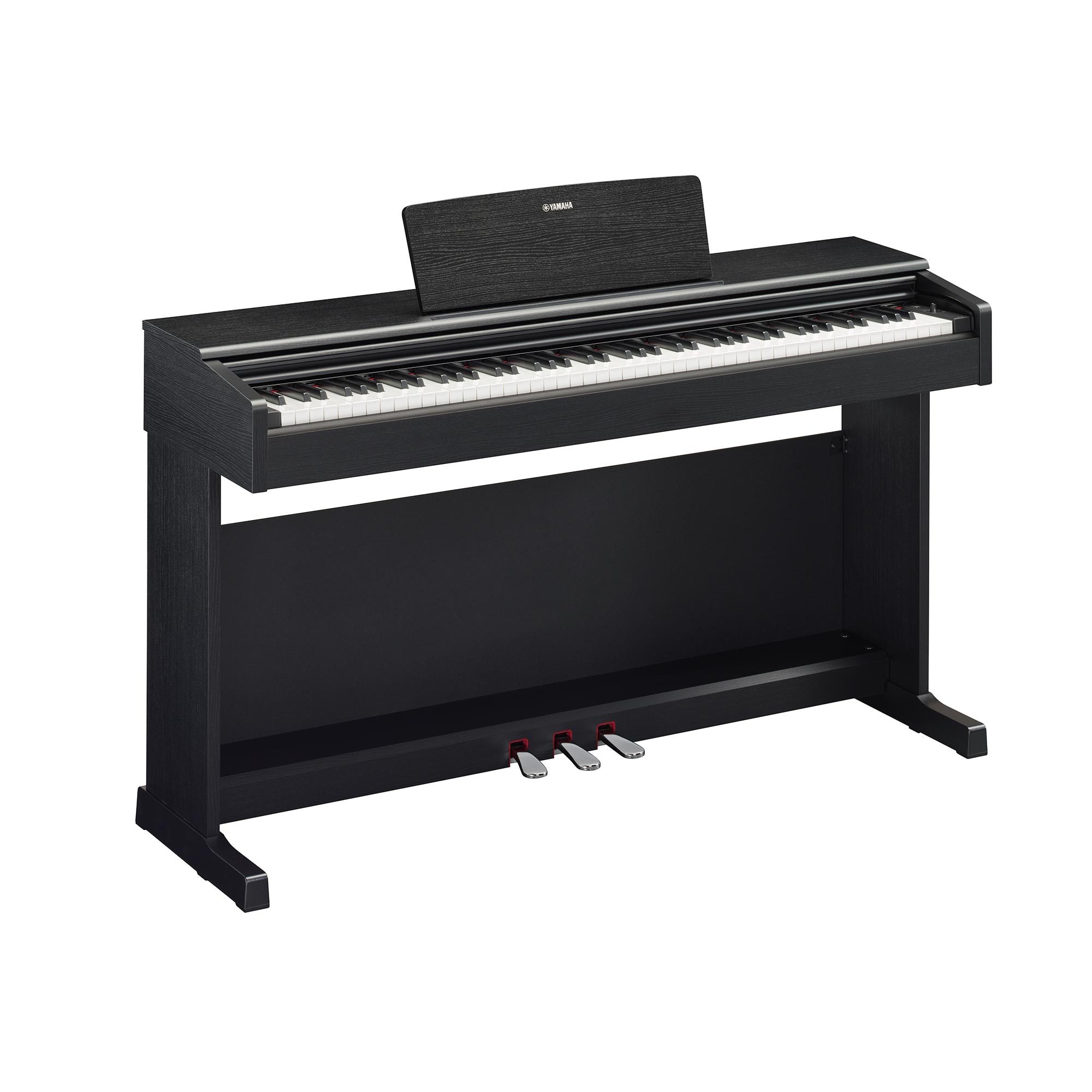An electric piano is a musical instrument that produces sound electronically. It imitates the timbre of a traditional piano through amplified speakers.
Electric pianos emerged during the mid-20th century, offering musicians the versatility and convenience of electronic sound. These instruments allow for volume control and are often more portable than their acoustic counterparts, making them a popular choice for performers and recording studios.
Unlike acoustic pianos, which generate sound through hammer-struck strings, electric pianos typically utilize electromagnetic pickups and amplifiers to produce their distinctive tones. Various models feature a range of sounds and effects, giving players the ability to tailor their music. Renowned for their role in jazz, funk, and rock music, electric pianos have become integral to modern music production, appreciated for both their unique sound quality and functional adaptability.
The Evolution Of The Electric Piano
The electric piano holds a storied place in music history. Weaving through decades of development, electric pianos have transformed from basic stringed experiments to sophisticated digital instruments. This journey reveals a relentless pursuit of musical innovation and expression. Let’s explore the milestones of this evolution.
From Early Experiments To Modern Mastery
The genesis of the electric piano dates back to the early 20th century. Original instruments experimented with electrified strings and hammers. Yet their sound differed vastly from today’s models. The Rhodes Piano, invented by Harold Rhodes, marked a significant advancement in the 1940s. Its unique tonal quality earned it a place in countless jazz and rock recordings of the time. By the 1980s, digital technology revolutionized the instrument, leading to portable and versatile pianos. Modern electric pianos now emulate a vast array of sounds and instruments, serving as all-in-one keyboards for performers.
Key Innovations In Electric Piano Technology
- Magnetic pickups: These transformed vibrations into electrical signals.
- Hammer action keys: Created to mimic the feel of an acoustic piano.
- Multiple sound settings: Enabled one instrument to produce various tones.
- MIDI compatibility: Allowed pianos to communicate with computers and other devices.
- Digital sampling: Captured authentic sounds to be played through the piano.
Electric pianos introduced a spectrum of possibilities for music creation. The incorporation of MIDI in the 1980s stands as a monumental leap. It enabled pianists to expand their musical horizons and experiment with a world of sounds. Sampling technology further enhanced the timbre, allowing pianos to faithfully reproduce the sounds of their grand acoustic cousins and other instruments.

Credit: www.korg.com
Types Of Electric Pianos
Electric pianos come in various shapes, sounds, and sizes. This variety lets players explore a wide range of musical styles. Below, we’ll dive into the different types available on the market.
Distinguishing Analogs from DigitalsDistinguishing Analogs From Digitals
Electric pianos fall into two main categories: analog and digital.
- Analog electric pianos, like the iconic Rhodes, rely on physical components to generate sound.
- Digital pianos, in contrast, use electronic samples. This tech allows for various instrument sounds in one keyboard.
Popular Brands And Models
Many brands offer exceptional electric pianos. Musicians often have favorite brands or models for their unique features.
| Brand | Model | Type |
|---|---|---|
| Rhodes | Mark II | Analog |
| Yamaha | DX7 | Digital |
| Korg | Sv-1 | Digital |
| Nord | Stage 3 | Digital |
How Electric Pianos Work
Do you ever wonder how electric pianos create their magical melodies? Unlike their acoustic counterparts, these instruments harness electricity to produce sound. Let’s look into the inner workings of electric pianos and uncover the secrets of their harmonious tones.
The Mechanics Of Sound Production
Electric pianos generate sound differently from traditional pianos. Rather than hammers striking strings, these instruments use electronic signals to emulate the sounds of a piano.
- Keys on an electric piano connect to a circuit.
- Pressing a key sends an electrical impulse.
- This impulse triggers a tone generator.
- The tone generator then produces a specific pitch.
The Role Of Amplification And Speakers
Amplification and speakers are crucial for sound in electric pianos. These components work together to bring the music to life.
- A pre-amplifier boosts the electronic signal’s strength.
- The amplifier then raises the signal to a level that can power a speaker.
- Finally, the speakers convert the amplified signals into sound waves.
The quality of amplification and speakers affects the sound’s richness and volume. High-quality components can produce a sound that rivals acoustic pianos.

Credit: www.amazon.com
Electric Piano Features And Options
An electric piano isn’t just a musical instrument; it’s a hub of creativity packed with features. Today’s models come complete with various options that cater to the needs of both beginners and professional musicians. Let’s dive into the distinct characteristics making electric pianos a popular choice among music enthusiasts.
Weighted Keys And Responsiveness
Weighted keys are a fundamental feature as they simulate the heaviness of acoustic piano keys. This offers players the tactile feeling and dynamic control essential for expressive playing. Responsive keys detect touch intensity, allowing for nuanced performances. Whether you’re practicing for a concert or composing your next piece, these features ensure an authentic piano experience.
- Realistic touch: Feels like an acoustic piano
- Dynamic control: Play soft or loud
- Practice friendly: Ideal for learners
Built-in Effects And Modifications
Modern electric pianos offer a suite of built-in effects. These allow musicians to shape the sound to match their style or the genre they are playing. From reverb to chorus, and even more exotic effects like delay and flanger, the ability to modify sounds is at your fingertips. Electric pianos often include several presets, enabling quick changes between different tones.
| Effect | Function |
|---|---|
| Reverb | Creates spaciousness |
| Chorus | Adds richness and depth |
| Delay | Produces echoes |
| Flanger | Generates a swirling effect |
Using Electric Pianos In Modern Music
The sound of electric pianos has influenced the heart of modern music. These versatile instruments bring unique vibes to any tune. They’re not just old-school; they’re cool, contemporary, and crucial in today’s music scene. Let’s dive into how electric pianos resonate across various genres and spotlight some iconic tracks and artists.
Genres That Embrace Electric Pianos
Electric pianos shine across many music styles. They add warmth to a song. They blend in or stand out, just as needed. Here’s a look at where they fit in:
- Jazz: Smooth lines weave through rhythms.
- Rock: It punches through with gritty tones.
- R&B: Soft and soulful melodies come alive.
- Pop: Catchy hooks get an extra zing.
- Hip-Hop: Grooves level up with electric vibes.
Famous Recordings And Artists
Breathtaking tunes have come from artists with an electric piano. These artists include legends and music icons. Let’s peek at some who made history:
| Artist | Hit Song |
|---|---|
| Stevie Wonder | “Superstition” |
| Ray Charles | “What’d I Say” |
| Norah Jones | “Don’t Know Why” |
| Herbie Hancock | “Chameleon” |
| Queen | “You’re My Best Friend” |
Choosing The Right Electric Piano
When starting your musical journey or advancing your skills, selecting an electric piano is a pivotal decision. An array of keys, weights, and sounds await. This section uncovers essential aspects to consider for both beginners and seasoned musicians.
Considerations For Beginners And Professionals
Beginners should look for user-friendly features and affordability. Professionals may value nuanced sound and tactile response.
- Key Action: How real the keys feel
- Sound Quality: The richness of the piano tone
- Learning Tools: Built-in lessons or apps
- Portability: Ease of transport for performances
Price Ranges And Investment Tips
Electric pianos come in varied price brackets. A budget-friendly selection often fits beginners. Experts may invest more for advanced features.
| Level | Price Range | Investment Tips |
|---|---|---|
| Beginner | $100 – $500 | Focus on essential features that aid learning. |
| Intermediate | $500 – $1,000 | Quality takes precedence, look for improved sound and action. |
| Professional | $1,000 – $5,000+ | Invest in durability, premium audio quality, and expressive touch. |

Credit: usa.yamaha.com
Is a Yamaha Electric Piano a Good Option for Beginners?
Looking for yamaha electric piano pricing info for beginners? A Yamaha electric piano is a great option for those just starting out. With its reliable quality and affordable pricing, beginners can start their musical journey on a dependable instrument without breaking the bank.
Frequently Asked Questions Of What Is An Electric Piano
What Is The Difference Between A Digital Piano And An Electric Piano?
A digital piano emulates an acoustic piano’s sound and feel, often with weighted keys. An electric piano generates sounds electronically and typically has a distinctive, retro sound profile.
What Is The Difference Between A Stage Piano And An Electric Piano?
A stage piano offers realistic sounds and feel for live performances, with higher-quality keybeds and often more sounds. Electric pianos are more portable, typically have fewer features, and aim for basic practice needs.
How Does An Electric Piano Work?
An electric piano generates sound electronically when keys activate sensors that trigger synthesizer circuitry. These instruments often feature weighted keys to mimic acoustic piano action, allowing for dynamic play. Sound amplification is through built-in speakers or an external sound system.
Is An Electric Piano Good For Beginners?
An electric piano is an excellent choice for beginners due to its affordability, volume control, and variety of built-in learning tools. It requires minimal maintenance and offers a headphone jack for quiet practice.
Conclusion
Embracing the world of electric pianos opens up a universe of musical possibilities. Whether you’re a beginner or a seasoned pro, these instruments offer versatility and convenience. Their ability to merge tradition with technology makes them a standout choice for any musician’s arsenal.
Let the music play on electric keys!
